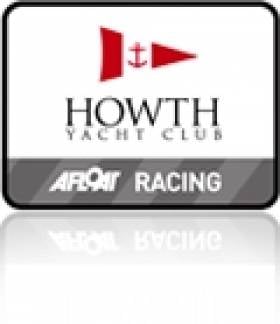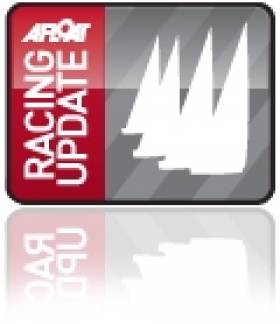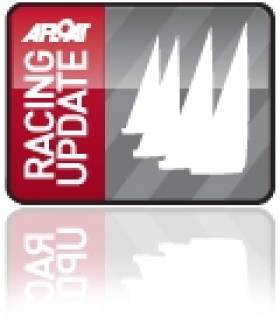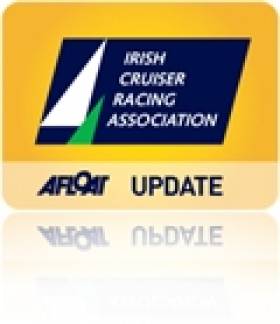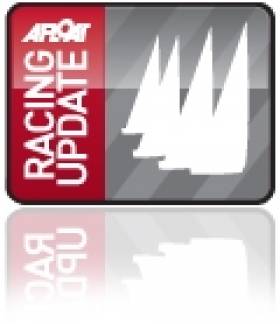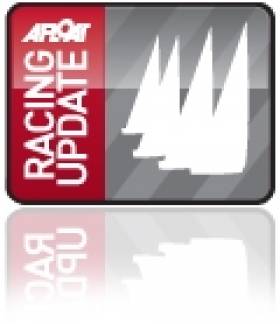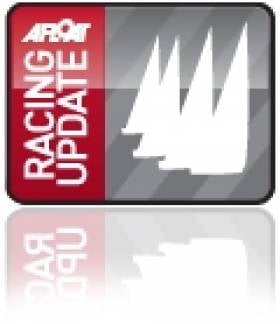Displaying items by tag: King One
Famous Half–Tonner Checkmate Gets New Berth At Howth Yacht Club
#checkmateforhowth – The story is that there has been a bit of re-juggling in the Half Tonner lineup at Howth, where Dave Cullen has moved on from the historic King One which once upon a time took the Half–Ton World Cup for the legendary Paul Elvstrom of Denmark, whose Olympic gold medal scoreline is bested only by Ben Ainslie.
The good news is that King One is going to continue to sail the waters of fair Fingal. She now has a Rush-based owner, who plans to continue to keep her at Howth where they've a handy little group of classic Half Tonners sharpening up for 2015.
And a further welcome word is that Dave Cullen himself will be returning to the fray, having taken over Nigel Biggs' all-conquering Half Tonner Checkmate. This little honey has had so much TLC and classy mods made in recent years that 'tis said a statement had to be issued saying the boat is NOT called Cheque Mate...........
#halftonclasics – Stunning, is the best way to describe the opening day of the 2014 Half Ton Classics Cup in Saint-Quay-Portriuex on the north coast of Brittany writes Fiona Brown. The weather offered something for everyone including plenty of sunshine and a range of wind conditions, the race management provided three great windward leeward races, and the Half Tonners and their crews excelled themselves by providing seat of the pants racing all day.
It is clear that the level of competition in the 22-strong fleet has taken a significant leap forward this year. After racing Richard Hollis of Crakajax, an X-95 production Half Tonner from Cowes, which has competed in many of the Half Ton Classics events, noted; "It's much tougher this year. The racing is extremely close. Just one small mistake and you loose several places. The quality of the sailing in outstanding." This was borne out by the results where the boats were frequently separated by mere seconds on corrected time and a different boat won each race. Race one went to Francis Marshall's 1989 Andrieu designed Concord, race two to Bernard Fournier Le Ray's Brittany Drizzel, a 1978 Berrett design, and race three to Peter Morton's beautifully refitted 1977 Farr designed Swuzzlebubble.
With three races completed fleet newcomer Peter Morton, better known as the man who revived the Quarter Tonners and who won his fourth revived Quarter Ton Cup just a fortnight ago, is leading the fleet. Swuzzlebubble is something of a legend among Half Tonners and this is her first serious outing at a Half Ton Classics event. Despite being the new kids on the block Peter and his very experienced crew laid down a 2, 2, 1 score as they found their feet in the boat. Two points behind in second place overall is Bernard Fournier Le Ray's Brittany Drizzle, which has achieved great success in her home port of La Trinite. In third place overall on 20 points is the 1980 Joubert-Nivelt designed Sibelius, owned by Claude Charbonnier who is also based in La Trinite and is another regular on the Half Ton circuit. Philippe Pilate's General Tapioca (1978 Jean Berret) is in fourth place with 21 points and Toni Stoschek's Superhero (1988 Andrieu), Nigel Biggs' Checkmate XV (1985 Humphries) and David Evans' Hullaballoo XV are all tied for fifth on 23 points. Hullaballoo XV is a 1978 Stephen Jones designed Hustler 32 and as such she is also the leading boat in the Series Division for production Half Tonners.
The different race winners also represented very different approaches to Half Ton campaigning. Whilst all the boats in the fleet are immaculately maintained there are some who take a strictly traditional approach, retaining their runners and checkstays and keeping their deck layouts as original, while others choose to modernise the boats as much as is possible within the confines of the strict class rules.
Winner of race one Francis Marshall is definitely an owner who takes a classic approach in regard to Concord, his carbon composite and full titanium Half Tonner which he campaigns with a bunch of Enterprise dinghy sailing friends from Loo in Cornwall. When Francis purchased Concord in 2008 she had been fitted with a small swept back spreader rig and much of the original titanium had been removed. Francis painstakingly restored the entire boat including replacing all the titanium and she is now in perfect as original condition. Their win in today's first race was a nice book end moment for Francis and Concord as they also won the final race of the 2011 Half Ton Classics Cup in Cowes, which was her last serious racing outing. Francis explained; "Concord has been in a lorry park so she hasn't been sailed since Cowes. We launched her in Plymouth about a month ago and sailed four Wednesday nights in training for this, although we didn't quite manage to get all the crew on the boat at the same time until we came here. So we were quite pleased with that first race and it all came together well!"
Swuzzelbubble represents the opposite end of the refit spectrum and has been extensively optimised for IRC with a swept back spreader rig and a fully modernised deck layout. Rob Lark, tactician aboard Swuzzlebubble, acknowledged that the boats with a more modern rig and deck layout do have some advantages, particularly in close tacking duels when the need for extra time to change runners can make all the difference to a boat, as Brittany Drizzle, who retains her runners and checks, found out when they engaged in a tacking duel with Swuzzlebubble on the second beat of race two.
This evening the crews enjoyed a rousing prize giving in the Half Ton Classics Cup Regatta Marquee, cheering loudly for each boat as their name and finish position in the racing was called out. The three race winners were called to the podium and presented with specially engraved Harken winch handles.
Tomorrow the boats will take part in a short offshore race starting at 10.00 that will take them around l'Ile de Brehat, a stunningly beautiful archipelago of pink granite islands that lie a mile off the Brittany coast and some 25 miles to the north west of Saint-Quay-Portrieux. The regatta continues until Friday.
#halfton – As well as defending Royal St. George YC champion Checkmate XV (Nigel Biggs), Ireland will send at least three more potent Half Tonners to the Classics Cup in France in two months time. Currently confirmed entries are Dave Cullen's King One and the Evans' brothers 'Big Picture' having just completed a major optimisation both from Howth with Harmony and George Radley's new boat from Kinsale yet to confirm.
The growing interest in the class is breathing life back into old boats that can be bought for as little as €5,000 and their ability to be towed is also seen as a great benefit.
While the Half Ton Classic Cup is raced on IRC and this is the prize the top boats have in their sights, the "Half Ton True Spirit" prize is regarded by many as the top prize and last year was won by a boat that had no optimisation whatsoever".
The entry list is expanding rapidly for the Half Ton Classics Cup which will be held at Saint Quay Portreiux in Northern Brittany from 7 to 11 July 2014. More than 30 teams are expected to attend, and this 7th edition of the regatta is anticipating a bumper turnout including many of the best known boats and sailors in the class.
Launched in 2003, the Half Ton Classics Cup led the way for the revival of the IOR Classes and its philosophy has helped to ensure that most boats remain as close to their original designs as possible.
This year the HTCC regatta will be a true European championship for small IRC rated boats, with all the top French and UK halftonners on the starting line.
With two weeks to go until the initial entry closing date of 31st May 2014, the Entry List alread includes some 25 boats with additional entries being added regularly. Among the well known names competing this year are past Half Ton Classics Cup winners General Tapioca, Chimp and Checkmate XV. There will also be several new faces at the event including Peter Morton, better known to many as the man behind the Quarter Ton Cup revival, who will be racing his IRC optimised Half Tonner Swuzzlebubble.
The regatta will be hosted by the Sport Nautique de Saint Quay Portrieux in collaboration with the Bruxelles Royal Yacht Club and the Half Ton Class Europe. Registration will open on Sunday 6 July, there will be practise racing on Monday 7 July and Championship racing will take place from Tuesday 8 to Friday 11 July.
ICRA Nationals 2014 Will See Duel of Vintage Half–Tonners
#halftonner – In what is being billed as the 'Duel of the Half Tonners' by ICRA organisers for June's National Championships another vintage half–tonner 'The Big Picture' is being optimised for competition. According to ICRA Commodore Norbert Reilly, the Howth campaign plans to take on the Nigel Biggs Sistership MG30, the all conquering ICRA National Champion, Check Mate IV.
Though, currently for sale on Afloat.ie, there is also the prosect of a three way half ton battle with Dave Cullen's King One, a boat that has taken its own share of silverware.
Commodore Reilly's own boat, Crazy Horse is at Malahide marina boatyard to sort out damage sustained at last year's Volvo Dun Laoghaire regatta Week.
The overall leader of the 2013 event was forced out after a collision with J109 clubmate, Storm. Both boats were doing seven knots at the time of the incident.
His Cruisers Zero crew is preparing for the nationals as part of the Howth YC Team and mounting a bid to win the Club Championship Trophy currently held by Royal Irish YC.
Reilly has hinted that former crew mates David Harte and Led Pritchard (both ex Comanche Raider crew) will join the boat.
Half Tonner Checkmate Wins Classic Cup in Boulogne Sur Mer
#halftoncup – The Half Ton Classic Cup in Boulogne Sur Mer was convincingly won by July's Dun Laoghaire Volvo regatta winner, Checkmate (Nigel Biggs) sailing under the Royal St. George Yacht Club burgee with a succession of race wins.
Recently W M Nixon followed the winding path which has led through various attempts at creating offshore one designs into the success of the Ton Cup categories, and their recent revival as classics using the IRC handicap system - just like everyone else.
Also competing in France was Howth Yacht Club's King One. Having broken her mast in Cowes in the last event when leading the pack, there was a greater enthusiasm to return to the fleet with a bang. Winds varied from 5 to 20 knots during the week with glorious sunshine and temperatures except for a gloomy wet grey day on the Thursday of the event.
Lying a solid fourth in the 28–boat fleet on the Wednesday evening, this gloom extended to King One when they were black flagged on the double point non discardable offshore which put pay to any chance of a decent overall result. Ironically, the boat that pushed King One over the line at the start also was disqualified for being over.
Irish Yacht Rewarded With Huge Trophy Haul After Ramsgate Voyage
#halftonner – Howth half tonner King One finished Ramsgate Week on the East Coast of England last Saturday with five firsts and discarded a second to be top scoring boat of the regatta. The Royal Temple Yacht Club in Ramsgate provided a huge welcome for their first ever Irish entrant which proved hugely popular with competitors and organisers alike.
Skipper Dave Cullen with his crew of Aidan Beggan (main), Andy George (Trim), Grainne Beggan (Pit), Rob Kerley (Bow) and James Hynes (Trim/Tactics) enjoyed a tiring week that had this sociable crew in bed by 11:00pm on some evenings!
The regatta which was sailed in 20-25 knots was split into two, the first being the three day Ramsgate Coastal Series where one long race was sailed each day. In a varied class, King One won two races with one day lost to lack of wind.
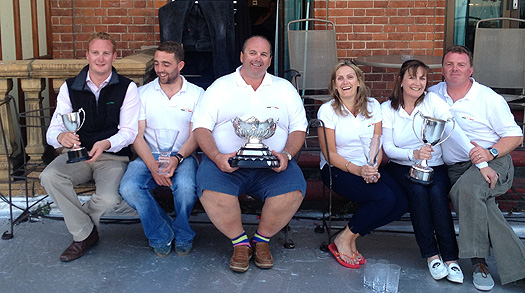
Irish visitors – (L-R) Andy George, Rob Kerley, David Cullen, Deirdre Cullen, Grainne Beggan, Aidan Beggan
The second series was the Ramsgate Week Regatta Series and the fleet was enlarged to include the heavy artillery of the Belgian half ton fleet joining in. The series kicked off with the famous Round the Goodwins
offshore race. Sailed in 20-32 knots of breeze, King One won this race with a corrected margin of over half an hour ad enjoyed a fantastic sleigh ride with speeds hitting 15 knots at times. There followed a day with two shorter races and again King One excelled to win both with ease. With the regatta won with a day to spare, the final day became a fantastic match race with hot shot half tonner, General Tapioca from Belgium and the lead changing six times, again with King One taking victory. Whilst this match race was on, Belgian Half Tonner A+ caught up to take first on corrected leaving King One second.
King One was rewarded with a huge haul of trophies, cups and prizes and skipper David Cullen made the competitors' thank you speech at the prize giving presenting Commodore Mike Brand with a HYC burgee to add to their collection.
Next year it is Boulogne for King One for the Half Ton Cup!
A race win for Dave Cullen's King One leaves the Howth boat tenth after day three of the Half Ton Classic Cup.
When the Solent is on form there is no better place in the world to sail and it delivered in spades for the third day of racing at the 2011 Cup supported by South Boats. Three more races were completed, two windward/leewards followed by a round the cans course, bringing the total number of races sailed to seven. The wind ranged from 7-8 knots in the morning up towards twenty during the afternoon and the sun shone all day, more than making up for yesterday's wet and misty conditions.
The mix of racing formats went down well with the competitors and once again Rob Lamb and the Royal Corinthian's Race Committee did an excellent job of managing the races, with the team kept busy regularly tweaking the mark positions on the windward/leeward courses. It was a day that required patience and steady nerves with the wind often coming down in streaks. Boats only a matter of yards apart could be sailing in winds of significantly different strength and direction - described ruefully by Chimp's tactician Roger Merino as "the splatter effect".
One of the most marked characteristics of this event is how incredibly close the racing is. Yet again today there were multiple cases of boats finishing within seconds of each other. Every mark rounding brought close quarters action and this evening the protest committee were in business again adjudicating on a leeward mark incident during race six, the second race of the day, involving David Evan's Hullabaloo XV, Christopher Haworth's Beat & Run and Robbie Tregear's Per Elise. Hullabaloo XV was found to be in the wrong and was disqualified - a great disappointment as they had finished the race in eighth place.
Each race today had a different winner and whilst many of the familiar faces continued to feature it was great to see some new names making it into top ten as well. Race five was won by Philippe Pilate's General Tapioca with Jean-Philippe Cau's Sibelius 29 seconds behind her and Alain Delvaux's Waverider third. Race six went to Waverider by 18 seconds from Chimp with General Tapioca third. In the final round the cans race David Cullen's King One took victory by 52 seconds - the biggest winning margin of the day, Chimp was second and General Tapioca third.
For overnight leader Chimp, it was a day of consolidation and pleasant surprises. As they came ashore they knew they had finished fourth in race five but races six and seven were too close to call and they feared they were fifth or worse so were delighted to come ashore and find they had in fact come second in both races. As a result they extend their overall lead of the championship to nine points. Moving back up into second place is General Tapioca with 29 points, 11 adrift of Chimp. Insatiable added eight, ten and six to her score card and holds onto third place, ten points behind General Tapioca. Chani had a mixed day and really struggled in the round the cans race, finishing 24th, so drops down from second to fourth.
In the Production Boat Series Chani is leading the fleet with Fredric Denis' Fletcher Lynd second and Mcihael Langhans' Strolch third.
Tomorrow three further races are planned. Racing continues until Friday 26th August with up to 12 races scheduled. Once eight races have been sailed a second discard will come into play. The forecast for tomorrow is for overcast and possibly rainy conditions with around 15 knots in the morning, dropping to perhaps 7 knots during the afternoon as the skies clear.
King One Gets off to Strong Start in Half Ton Cup
Ireland's only representative in the Half Ton Cup has opened his account with a third placing, David Cullen's King One from Howth Yacht Club was vying for the lead in the first race yesterday and with an early start this morning in a race around the Isle of Wight Cullen is again in the hunt in the offshore race that counts for double points.
For the 38 strong fleet assembled in Cowes for the 2011 Half Ton Classic Cup, supported by South Boats, today's opening three races were confirmation that the Half Ton Class continues to go from strength to strength. Throughout each of the day's three races the fleet was tightly packed with plenty of close quarters drama keeping both the sailors and the spectators on the edge of their seats.
The entry list represents a true cross section of the original Half Ton fleet with the oldest boat being the 1977 Davidson designed Waverider, owned by A Delvaus of Belgium, a double winner of the Half Ton Cup in 1978 and 1979 when skippered by Laurie Davidson himself. The newest boat in the fleet is the 1992 Caccerelli designed Per Elisa, owned by Britain's Robbie Tregear, which was the last of the grand prix Half Tonners ever built, launching in 1992.
Racing was initially postponed for two and a half hours whilst the fleet waited for wind but the wait was worth it with a nice 10-12 knots from 135 degrees filling in around lunchtime. The Race Committee, led by Race Officer Rob Lamb, was able to set up shop on the Hill Head Plateau and with judicious use of a relatively short windward leeward course they achieved three races that tested the teams to the full.
In the opening race Half Ton Class Chairman and defending champion Philippe Pilate's General Tapioca took an early lead on the water and on corrected time and despite the many attempts by Francois Michelin's Chani and Cullen's King One they held their lead through until the finish. On corrected time General Tapioca won by 34 seconds from Chani with King One taking third by just three seconds.
Race two went to Sibelius, owned by Jean-Philippe Cau who also took control of the race early on and then refused to relinquish their lead. Michael Kershaw's Chimp finished 57 seconds behind them with Tim and David Cunliffe's Insatiable three seconds behind that in third place. General Tapioca had to settle for fourth, just nine seconds behind Insatiable.
In race three General Tapioca came to the fore again, this time winning by ten seconds from Chimp with Denzil Williams' Santa Evita third and Robbie Tregear's Per Elisa fourth.
In the overall standings General Tapioca now leads the fleet by two points from Chimp who counts 8 points, with Sibelius third on 14 points, Chia fourth on 22 points and Insatiable fifth on 24 points.
The event also features a special division for Production Boats, which this year features two Hustler SJ30s, two MG HS 30s, a Golden Shamrock, an Albin Ballad, an X95 and a Hustler SJ32. Today's top performer in the Production Division was Francois Michelin's Golden Shamrock Chiani, which won the first two races and finished second in race three. Richard Hollis's X95 Crakajax now lies in second place thanks to a 3, 3, 1 score line with Frederic Denis' Fletcher Lynd, a Hustler SJ30 two points behind in third.
After racing Mike Relling, who is sailing aboard Insatiable with David and Tim Cunliffe, commented on the incredible quality of the racing. "It was very close and I think the good thing is that among the top ten boats there are only seconds between each place so mark roundings, boat handling, all of the little details are very, very important. I think that says a lot about the Half Ton Class, the success of the class and the success of IRC. The ratings seem to be pretty fair, and like any good regatta if you sail well you will do well, if you sail badly you will do badly and there's nowhere to hide. I think that makes it a fantastic event."
Today the fleet will be racing around the Isle of Wight. The start is scheduled for 07.30 from the Royal Corinthian Yacht Club start line off Cowes and the fleet will round the Island anti-clockwise. With a forecast for moderate to fresh winds, a double points weighting and a no discard on the score for the race we can anticipate another exciting day. The regatta continues until Friday 26 August with up to twelve races scheduled.



























